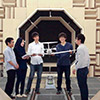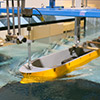Educational Aims
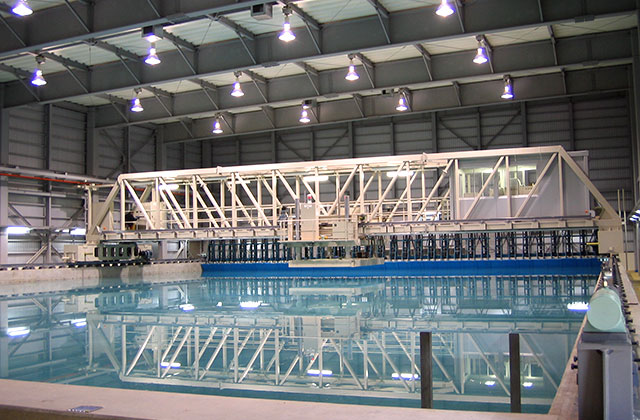 Effective utilization of ocean space, especially development of transportation systems, utilization of artificial land space on the sea and sustainable marine resources development, is an important challenge. It is imperative to develop new-generation systems that are able to integrate land, coastal and ocean transportation. Coastal transportation systems are viewed as a potential solution for supplementing saturated land transportation. Intelligent access procedures are required for efficiently developed waterfront communities. Planning and construction methods are needed for the utilization of artificial land space on the sea, the construction of infrastructures (offshore floating airports and power plants, etc.) and the facilities for leisure activities (passenger cruise ships, marine leisure complexes, etc.). In addition, the development of peripheral technologies for the exploration and mining of marine resources, such as subsea transportation and machine operation, is in high demand. Amongst other technologies required for ocean development, naval architecture is particularly important. To provide useful solutions for these social demands, the Department of Naval Architecture and Ocean Engineering is offering students the opportunity to study marine utilities and naval architecture, including marine transportation systems, biological and mineral resource development technologies and the planning of ocean spaces. The research objective of this department is to propose a wide range of environmentally-friendly marine applications and to develop technologies related to them, whilst taking full advantage of the achievements in naval architecture, marine engineering, industrial engineering and systems engineering in a comprehensive manner.
Effective utilization of ocean space, especially development of transportation systems, utilization of artificial land space on the sea and sustainable marine resources development, is an important challenge. It is imperative to develop new-generation systems that are able to integrate land, coastal and ocean transportation. Coastal transportation systems are viewed as a potential solution for supplementing saturated land transportation. Intelligent access procedures are required for efficiently developed waterfront communities. Planning and construction methods are needed for the utilization of artificial land space on the sea, the construction of infrastructures (offshore floating airports and power plants, etc.) and the facilities for leisure activities (passenger cruise ships, marine leisure complexes, etc.). In addition, the development of peripheral technologies for the exploration and mining of marine resources, such as subsea transportation and machine operation, is in high demand. Amongst other technologies required for ocean development, naval architecture is particularly important. To provide useful solutions for these social demands, the Department of Naval Architecture and Ocean Engineering is offering students the opportunity to study marine utilities and naval architecture, including marine transportation systems, biological and mineral resource development technologies and the planning of ocean spaces. The research objective of this department is to propose a wide range of environmentally-friendly marine applications and to develop technologies related to them, whilst taking full advantage of the achievements in naval architecture, marine engineering, industrial engineering and systems engineering in a comprehensive manner.
Admission Policy
Naval Architecture and Ocean Engineering is the study and investigation in the technology to utilize functions of marine resources that consists of 1) functions of traffic and transportation, 2) functions of energy, mineral, or life resources production, 3) functions of spaces for stock or habitation. Students who wish to study in this department are expected to have following:
- Completed a bachelor program in Marine engineering, i.e., mathematics, marine hydrodynamics, and marine structural mechanics to study our programs smoothly.
- A strong interest and vocation in the issues of marine systems engineering, e.g., utilization of ocean space, utilization or transportation of marine products or energy resources, sustainable marine resources development, traffic and transportation systems, and desire to undertake applied research based on fundamental knowledge, and a strong sense of engineering ethics.
- Sufficient knowledge of language to deal with international issues.
Overview
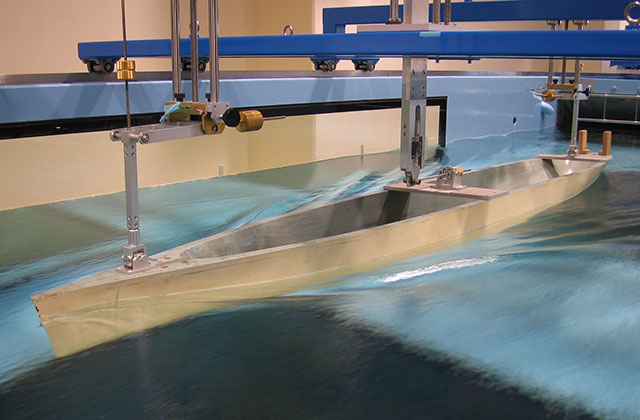
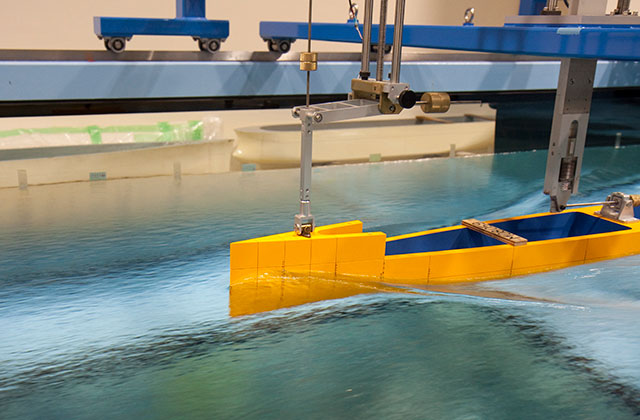
To study the broad range of technologies required for marine technologies and naval architecture, students must acquire fundamental engineering knowledge as well as organizational skills based on a wider vision than simply marine technologies and naval architecture. This course of study combines structural, fluid, heat, materials, and control engineering in a curriculum designed to develop system engineering skills which can be practically applied in the design or construction of ships, and marine and offshore structures. In addition, lectures and seminars related to numerical skills, e.g. computer programming languages, numerical analyses and simulations, are provided as these numerical skills have an important role in the design and production of marine technologies.
This course of study consists of the following nine areas of education and research: 1) Marine Hydrodynamics, 2) Marine Dynamics and Control, 3) Structural Design of Marine Systems, 4) Fatigue, Fracture, Welding Mechanics and Production Systems, 5) Functional Systems Engineering, 6) Ship Design and Maritime Intelligent Technology, 7) Ocean Energy Resources, 8) Structural Dynamics, 9) Planning of Marine Systems.
Some of the representative research subjects include: computer aided design using meta heuristic algorithms; the development of optimization methods for the hydrodynamic performance of hulls and propellers; the development of automatic vessel navigation systems; the methodology of safety design based on the risk assessment for ship and ship building; final buckling strength of hull structures; response analysis of Very Large Floating Structures (VLFS); development of fatigue life evaluation methods based on numerical fracture mechanics; and the establishment of a database for long-term wave statistics based on satellite information. Research facilities including a circulating water channel, a sea keeping and manoeuvring basin, hydraulic fatigue testing machines and an impact loading test rig, are available.
Researches
- Marine Hydrodynamics
- Marine Dynamics and Control
- Structural Design of Marine Systems
- Fatigue, Fracture, Welding Mechanics and Production Systems
- Functional Systems Engineering
- Ship Design and Maritime Intelligence Technology
- Ocean Energy Resources
- Structural Dynamics
- Planning of Marine Systems




